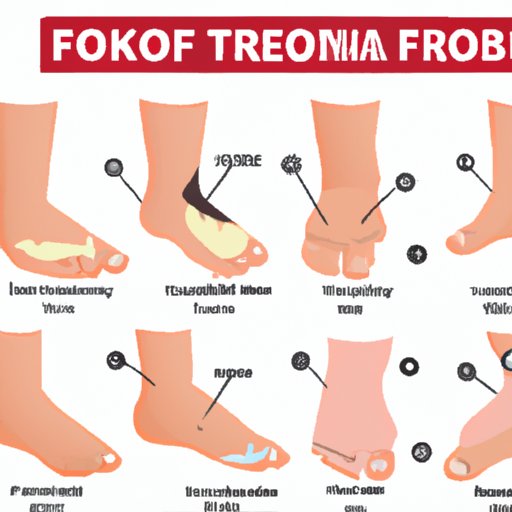
Introduction
Broken toes are a common injury and can be quite painful. They can be caused by dropping a heavy object on the foot, stubbing a toe, or engaging in activities that put a lot of stress on the toes, such as running or playing sports. In this article, we will explore how to know if you broke your toe, the different types of foot injuries, and how to treat and prevent future injuries.
Signs and Symptoms of a Broken Toe
The signs and symptoms of a broken toe can vary depending on the severity of the injury. Some common symptoms include:
- Bruising
- Swelling
- Difficulty walking or putting weight on the foot
- Pain that worsens with movement
- The toe takes on an abnormal or crooked shape
If you are experiencing any of these symptoms, it’s essential to consult a healthcare professional for an accurate diagnosis and treatment plan. Ignoring a broken toe can make the injury worse and lead to long-term complications.
Comparing Different Foot Injuries
Besides a broken toe, some other foot injuries you may encounter include sprains, stress fractures, and breaks in the foot’s bones. So, how do you differentiate a broken toe from other common foot injuries?
A sprain in the foot can be as severe as a break but can also affect the joints, leading to pain and inflammation. Stress fractures, caused by overuse, have symptoms similar to those of a sprain but do not swell as much and heal faster. A broken bone in the foot can cause more widespread swelling and pain, making it difficult to walk.
Treatment and Healing
There are several treatment options available to help alleviate pain and inflammation associated with a broken toe. Ice and over-the-counter pain medications, like acetaminophen or ibuprofen, can help reduce swelling and alleviate pain. Elevation and rest of the affected foot can also provide some relief.
It typically takes four to six weeks to heal a broken toe, depending on the severity of the injury. It’s essential to avoid activities that could further damage your injured toe during the healing period. In severe cases, surgery may be necessary to realign the bone and ensure proper healing.
Prevention
Preventing foot injuries involves simple steps like wearing proper footwear, especially when engaging in strenuous activities like hiking or sports. Wearing shoes with good arch support and non-slip soles can help avert injuries like sprains and fractures.
Avoiding activities that put strain on your toes and feet is a significant step towards preventing injuries. For example, runners should use appropriate running shoes to maintain balance and stability. Individuals who play sports that require quick stops and starts should consult their physician or sports medicine specialist for more tips and advice on preventing foot injuries.
When to Seek Medical Assistance
Some people may attempt to treat their broken toe without seeking medical attention, but it’s essential to contact a healthcare professional in case of severe pain, swelling, or crookedness. They may recommend an x-ray to diagnose the extent of the injury and provide an effective treatment plan.
In some cases, surgery may be necessary to realign the bones and ensure proper healing. A healthcare provider can also provide advice on pain management and further ways to prevent future injuries.
Personal Experiences
Many people have experienced a broken toe at some point in their lives and may have unique experiences. Some may be familiar with the injury and may offer strategies for relieving pain. For instance, people who work at jobs that require standing for long periods may suggest wearing cushioned footwear to relieve pressure and provide comfort.
Others may have unique suggestions for preventing future injuries, such as stretching exercises before and after engaging in strenuous activity. These personal experiences provide invaluable insights into how to manage and prevent foot injuries, and it’s critical to learn from them.
Conclusion
A broken toe is painful and can significantly impair an individual’s walking ability. Symptoms include bruising, swelling, difficulty walking, and toe shape change. Treatment options range from ice, elevation, over-the-counter pain medication, or surgery. Preventative measures like wearing proper footwear and avoiding high-risk activities can help prevent future injuries. When in doubt, it’s always good practice to seek medical advice in case of severe pain or swelling.





